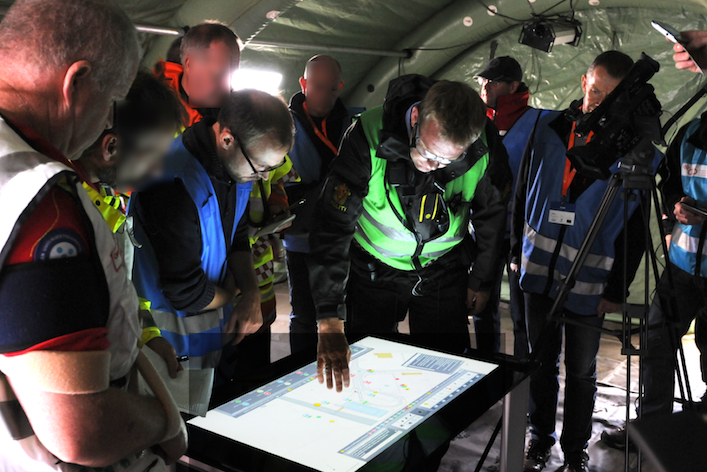Imagine:
You’ve just dropped off the kids. As you join the traffic, thinking about your day at work, a loud bang startles you and shortly after, your mobile sounds an emergency alarm. You check: A personalised warning about an explosion at a nearby chemical factory instructs you to evacuate the area, plotting an escape route that avoids the potentially toxic cloud. However, instead of sending these instructions via bluetooth to your car’s Satnav system, you turn around to go back to the school. The doors are locked, and on-site security personnel wearing masks advise you that the children have been moved to a shelter. You jump back into your car. A warning from your emergency services and health insurance has appeared on your mobile. Any injuries incurred as a result of disregarding the initial emergency warning, may not be covered. You acknowledge receipt and are issued with a recalculated escape route.
Disaster risk management and emergency response (DRM) increasingly depend upon IT, including personal data routinely processed as part of everyday life. This generates ambiguous ethical, legal, and social opportunities and challenges. While access to data about people’s movements and communication devices enables more agile, even personalised warnings, it also changes the social contract between citizens, emergency agencies, and related services, such as insurance providers. And it works both ways. If emergency responders – carrying an array of biosensors that monitor their oxygen supply, movements, and stress levels – continue to work beyond allowed thresholds, despite warnings, and make mistakes, they may be sued for negligence.
Where The isITethical? Project applies
Significant investment is underway. In the UK, a £1.2bn budget has been allocated for the transition of public safety communication technology to broadband. This is heavily criticised by the UK National Audit Office due to the lack of maturity of the technology and the risks associated with acceptance of the technology by public safety practitioners and publics. Many countries are embarking on a similar transition path. France aims at developing new communication capabilities to safeguard the public during the 2024 Paris Olympic games, and across Europe, there will be total investments in new broadband communication capabilities for public safety likely exceeding €100 billion. Africa is currently proposing to ‘leapfrog’ into biometrics.
At the same time, the Public Safety Communications technology business environment is in turmoil. In the past, the combination of specific requirements, limited volume of business, and need for significant R&D investment created high entry barriers, and this created specific technological ecosystems operating outside mainstream telecommunication business. This is changing with broadband as mainstream standardization (3GPP) and mainstream technologies (mobile networks, Apps) are applied. It has opened the market for SME to develop technologies for disaster risk management.
IsITethical? is developing Ethical, Legal and Social Implications (ELSI) guidance through active collaborations with practitioners, industry and policy-makers in the European context. Our partners and networks agree that a firmer grasp of ELSI opportunities and challenges is needed. The proposed convergence of existing efforts has the potential to embed advanced responsible research and innovation strategies in real world practice and industrial R&D, in concordance with civil and human rights.
There is a myriad (of conflicting) practice codes, legislation and norms, but currently these are restricted to individual sectors, regions or technological contexts e.g. design, management or commercialisation. This neglects the fact that technologies are uses within interconnected social, economic, political, cultural, organizational complexities enfolded into it in each stage. ELSI cannot be uniformly defined for all situations, and it is not possible to provide strict protocols, codes of conduct, rules, or step-by-step instructions. Instead, the aim is to promote creative and circumspective conversations on responsible scientific and technological innovation, including foresight into ELSI, specifically focusing on social justice and human rights. The aim is to foster encounters, open worlds, share meaningful experience, mapping consensus and tensions.
Contextual ElSI guidance research arose as part of a large scale European Union funded (2014-17) research project SecInCoRe (SecInCoRe.eu). IsITethical? is taking over the challenge in a collaboration between The Centre for Mobilties Research, CeMORE and ImaginationLancaster, by designing and developing a digital community platform and ethical exercises to foster encounters between the main stakeholders and partners across Europe. Through co-creative methods IsITethical? is edifying ELSI guidances and discussing them in the light of Brexit and the integrations to DRM of other technologies; broadband, IoT, drones and predictive analytics, and AI.
In a domain where timing is critical, IsITethical? is an invitation to take time, and together support creative thinking for the complexity of ELSI challenges and opportunities, making the guidances live, lived and living, to form a strategic community intended to support practices in practice.
IsItethical? the boardgame, offers interactivity offline to instigate conversation and discussions of the guidelines beyond the written document. All the ELSI conundrums that the player encounters are based on cases of the Pan-European inventory of past critical events and disasters, and their consequences and in the field work that the SecInCore researchers did. The game represents the tensions of public and private stakeholders, of responders with international capacities and local or regional responders, and opportunities and challenges that participation of social media and volunteer stakeholders may offer in an emergency response scenario.
ELSI cannot be learned by rote or uniformly defined for all situations. What the ethical exercise does, is to build worlds in which to experience ELSI reflecting in diverse situations, confront the different to make the difference.

